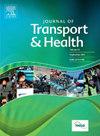Mental health, quality of life, and occupational balance among taxi drivers in Spain and Chile: A cross-cultural study
IF 3.2
3区 工程技术
Q2 PUBLIC, ENVIRONMENTAL & OCCUPATIONAL HEALTH
引用次数: 0
Abstract
Introduction
Taxi drivers are a vital component of urban mobility but face significant health risks from adverse working conditions, including prolonged periods of sitting, sedentary behavior, and exposure to pollutants. These factors contribute to the development of musculoskeletal disorders, cardiovascular issues, respiratory problems, and mental health challenges like anxiety and depression. Occupational Balance (OB) is crucial for maintaining health, yet its impact on quality of life (QoL) is underexplored. This study examines the relationships between QoL, mental health, and OB among taxi drivers in Zaragoza, Spain, and Valparaíso, Chile.
Methodology
An observational study was conducted with 174 taxi drivers (117 from Spain and 57 from Chile). Data were collected using an ad hoc questionnaire, the Short Form-36 Health Survey (SF-36), the Occupational Balance Questionnaire (OBQ-E), and the Depression, Anxiety, and Stress Scale (DASS-21). Sociodemographic details, QoL, stress, anxiety, and depression levels were analysed. Multivariate regression identified associations between QoL components and predictors such as financial situation, stress, anxiety, depression, and OB.
Results
Spanish taxi drivers reported better physical function and physical health than their Chilean counterparts, while Chilean drivers scored higher in vitality, social function, and mental health. Stress was a significant predictor of poorer mental health in both countries, with odds of 4.49 in Chile and 3.90 in Spain. Anxiety impacted both QoL components in Chile, whereas in Spain, financial situation and depression were key determinants. Chilean drivers had better overall OB compared to Spanish drivers.
Conclusions
Stress, anxiety, and depression significantly impact taxi drivers' health in both countries, with financial perception particularly influencing Spanish drivers. The findings highlight the need for comprehensive stress management and socio-economic interventions to improve the well-being of taxi drivers. This study offers new insights into the occupational health of taxi drivers across different cultural contexts, emphasizing areas for targeted policy and health interventions.
西班牙和智利出租车司机的心理健康、生活质量和职业平衡:一项跨文化研究
出租车司机是城市交通的重要组成部分,但由于恶劣的工作条件,包括长时间坐着、久坐行为和接触污染物,他们面临着重大的健康风险。这些因素导致了肌肉骨骼疾病、心血管疾病、呼吸系统疾病以及焦虑和抑郁等心理健康挑战的发展。职业平衡(OB)对维持健康至关重要,但其对生活质量(QoL)的影响尚未得到充分探讨。本研究探讨西班牙萨拉戈萨和智利Valparaíso计程车司机的生活品质、心理健康和产科之间的关系。方法对174名出租车司机(117名来自西班牙,57名来自智利)进行观察性研究。数据收集采用一份特别问卷,即短表36健康调查(SF-36)、职业平衡问卷(OBQ-E)和抑郁、焦虑和压力量表(DASS-21)。分析了社会人口学细节、生活质量、压力、焦虑和抑郁水平。结果西班牙出租车司机的身体功能和身体健康状况优于智利出租车司机,而智利出租车司机在活力、社会功能和心理健康方面得分更高。在这两个国家,压力是心理健康状况较差的重要预测因素,智利和西班牙的赔率分别为4.49和3.90。在智利,焦虑影响生活质量的两个组成部分,而在西班牙,财政状况和抑郁是关键决定因素。与西班牙司机相比,智利司机的整体OB更好。结论压力、焦虑和抑郁显著影响两国出租车司机的健康,其中财务感知对西班牙司机的影响尤甚。研究结果强调,需要进行全面的压力管理和社会经济干预,以提高出租车司机的幸福感。这项研究为不同文化背景下出租车司机的职业健康提供了新的见解,强调了有针对性的政策和健康干预领域。
本文章由计算机程序翻译,如有差异,请以英文原文为准。
求助全文
约1分钟内获得全文
求助全文

 求助内容:
求助内容: 应助结果提醒方式:
应助结果提醒方式:


